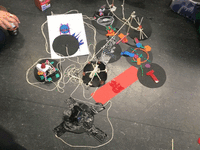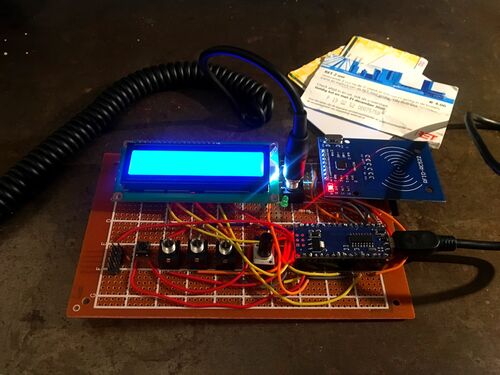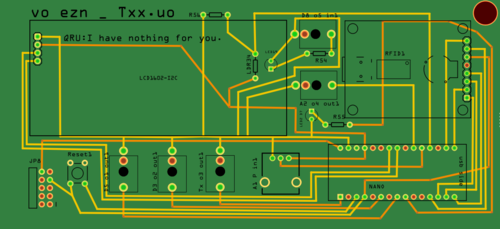User:E.zn/special issue X: Difference between revisions
| Line 17: | Line 17: | ||
[[File:Txx.uo_Prototype_1.jpg|500px|right]] | [[File:Txx.uo_Prototype_1.jpg|500px|right]] | ||
''Txx.uo'' consolidates two contrasting radio frequency implementation modes: RFID reader scans the cards/objects with RFID tags using radio waves and LCD screen displays a Q-code* [internationally established three-letter abbreviation used in radio communication]. | <br>''Txx.uo'' consolidates two contrasting radio frequency implementation modes: RFID reader scans the cards/objects with RFID tags using radio waves and LCD screen displays a Q-code* [internationally established three-letter abbreviation used in radio communication]. | ||
<span>*</span>A particular Q-code denotes a question when it is followed by a question mark and references an answer [statement] when it's not:<br> | <span>*</span>A particular Q-code denotes a question when it is followed by a question mark and references an answer [statement] when it's not:<br> | ||
Revision as of 12:50, 2 December 2019
Collaboration, Conflict & Consent
A two-day workshop with Eleanor Greenhalgh
_ Applying various methods of decision-making and evaluating the outcomes.
_ Practicing listening in teams of three [each having a specific role].
_ Playing group games, like counting to 20.
_ Creating a consensual artwork.
Module
Building a module with a guest tutor Dennis de Bel
Txx.uo manual [draft]
Txx.uo consolidates two contrasting radio frequency implementation modes: RFID reader scans the cards/objects with RFID tags using radio waves and LCD screen displays a Q-code* [internationally established three-letter abbreviation used in radio communication].
*A particular Q-code denotes a question when it is followed by a question mark and references an answer [statement] when it's not:
QRU? : Have you anything for me?
QRU : I have nothing for you.
The RFID technology is used for object identification, authentication and security reasons, whereas Q-code is transmitted on a specific radio frequency by a radio operator and can be intercepted by anyone, who is tuned in to the same frequency.
This module converts the data received from a scanned card into a sound and binary code. This Binary signal is then transfigured into LED blinking and is also funneled to another module through an output channel. Top row of an LCD screen displays a specific question from the list of a Q-code, depending on a knob position and when receiving a signal from another module, a random Q-code answer is shown on the second raw of the screen.
References by Aymeric
The Thinking Machine [1961]
Mark Weiser and John Seely Brown - Designing Calm Technology [1995]
Bruno Latour - The Third Meaning of Technical Mediation [small extract from Pandora's Hope 1999]
Lucent Technologies - Bell Labs Innovation Song [2000]
AT&T - Microworld with William Shatner [1976]
Friedrich Kittler - There is no Software [1995]
Ken Thompson - Reflections on Trusting Trust [1984]
Douglas Adams - Hyperland [1990]
Langdon Winner - Do artefacts have politics [1980]
Tim and Eric Awesome Show, Great Job! - Cinco Midi Organiser [2009]
Femke Snelting and Jara Rocha - MakeHuman [2018]
Robin James - Spotify Teardown: Inside the Black Box of Streaming Music



